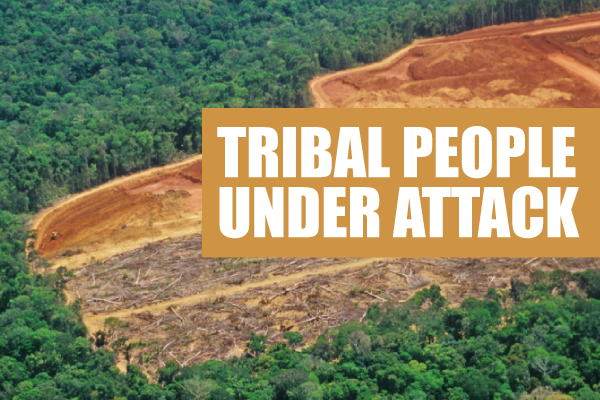This International Day of the World’s Indigenous Peoples, Survival International is calling attention to some of the tribes who fell victim to genocide. The international organization, which advocates on behalf of tribal people worldwide, fears history could repeat itself if urgent action isn’t taken to protect a particular tribe on the Brazilian-Peruvian border.
Early last month, Survival International learned that a formerly uncontacted tribe (a tribe that had no previous contact with industrialised societies) reached out to the Ashaninka, a neighbouring tribe in Brazil.
“This uncontacted tribe said that they left their home because their elders had been massacred by non‑Indians and that all their homes had been burned,” explained Ilana Nevins, spokesperson for Survival International. “There were so many people killed that they couldn’t bury them all – that those who couldn’t be buried had been picked at by vultures.”
The organization suspects that illegal loggers and cocaine traffickers are the likely culprits of this flagrant level of violence. Many of the area’s tribal people have already been pushed further into the forest as illegal logging and drug traffickers encroach on their land.
In addition to violence, isolated tribes that come into contact with people from industrialized societies are highly susceptible to introduced diseases. In the mid 1990’s, more than half of the Nahua people were wiped out following their first contact with loggers.
Seven tribal people who made contact last month were already showing signs of influenza, a disease to which they have no acquired immunity. FUNAI, the Brazilian government body charged with protecting tribal territories and their people, treated five young men and two young women for the disease.
With 70 uncontacted tribes within its borders and 14 million hectares of land (roughly two-and-a-half times the size of Nova Scotia), FUNAI has a daunting task – and not enough funds to do it. But Nevins says things have been improving.
“There are people – FUNAI staff – that care deeply that making sure these people and this land is protected,” said Nevins. “But that’s not enough; right now, there aren’t enough funds to make sure that all the uncontacted land is being monitored – that illegal loggers, miners and other people focused on resource extraction are kept out of this land.”
Survival International would like to see the Brazilian government allocate more funds to FUNAI. At present, they are calling on the government to urgently re-staff a government outpost that was overrun in 2011 by illegal loggers and drug traffickers.
The staff there was working to monitor and protect the land where the uncontacted tribe is believed to have resided.
Survival International is asking people to sign and send an email to the Brazilian and Peruvian governments, calling on them to monitor and protect these uncontacted tribes and their land.
In March of this year, the Peruvian and Brazilian governments signed an agreement to cooperate on cross-border monitoring and protection.
“So far this has not been sufficient to ensure that these people are protected,” concluded Nevins.
Members can find out more about Survival International at www.survivalinternational.org. You may also be interested in other articles we’ve written about tribal people, including: Rethink Your Vocab and last year’s article on oil exploration encroaching on the Matsés’ land, which is located within Peruvian borders.
